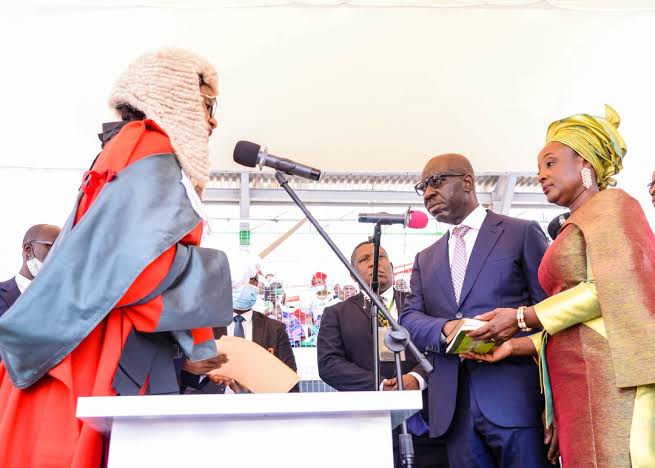

The Swearing in Ceremony of the New government in Edo State, Nigeria, led by Governor Monday Okpebholo, has again sparked mixed reactions from the public.
On one hand, his inaugural speech outlined promising plans to tackle insecurity, improve roads, empower farmers and small-scale businesses, and enhance education.
These initiatives align with the previous administration’s focus on economic growth and development, as seen in Governor Godwin Obaseki’s speech in his day. But we all saw how that ended.

However, concerns surround the legitimacy of the electoral process that brought Okpebholo to power, with many questioning its fairness and freedom.
This skepticism is compounded by the ruling All Progressive Party’s national performance, which has been underwhelming, to say the least. Critics worry that the party’s shortcomings at the national level may be replicated at the state level.
Key Concerns:
- Legitimacy of the Electoral Process: Questions surround the fairness and freedom of the elections that brought Okpebholo to power.
- Party Performance: The All Progressive Party’s national performance has been underwhelming, sparking concerns about its ability to govern effectively at the state level.
- Governor’s Grasp on Issues: Okpebholo’s struggle to eloquently deliver his speech has raised doubts about his understanding of the state’s challenges, and the capability to turn things around .
- Political Godfatherism: The influence of Senator Adams Oshiomole, a former governor, may hinder Okpebholo’s ability to govern effectively. To worsen the situation, the Vice President Shettima, said on LIVE TV that this era was the return of the Political Godfather – Adams Oshiomole.
Given the concerns surrounding the new administration in Edo State, it’s crucial for Governor Monday Okpebholo to proceed with caution and transparency.
To address the legitimacy concerns, he should prioritize Strengthening Institutional Frameworks by ensuring that all government institutions are autonomous and free from political interference.
Economic Growth and Development strategies, similar to those implemented by Governor Godwin Obaseki, which led to a 40% increase in internally generated revenue (IGR) in 2023, should be continued and expanded. These include:
- Investment Drive: Attracting new investments to the state
- Tax Administration: Improving tax collection and expanding the tax net.
- Economic Reforms: Implementing policies to stimulate economic growth.
To address concerns about his grasp on issues, Okpebholo should Surround Himself with Competent Advisers and ensure that his cabinet members are experienced and knowledgeable in their respective fields.
Transparency and Accountability measures should be put in place to prevent political godfatherism and ensure that the administration is answerable to the people. These include:
- Regular Press Briefings: Keeping the public informed about government activities
- Open Governance: Making government records and data accessible to the public.
- Anti-Corruption Agencies: Strengthening institutions that prevent and investigate corruption.
To tackle the major issue of insecurity in Edo State and ensure farmers can return to their farms without fear of kidnappers, a multi-faceted approach is necessary.
Short-term Solutions
- Community Engagement: Encourage collaboration between local communities and security agencies to share intelligence and prevent attacks.
- Security Architecture: Employ security architecture to check the menace of farmer-herder clashes and kidnappings.
- Emergency Response Plan: Establish a rapid response system to quickly respond to security incidents and provide aid to affected farmers.
Long-term Solutions
- Economic Empowerment: Provide financial support, training, and resources to farmers to enhance their economic resilience.
- Agricultural Policy Review: Develop and implement policies to reinvigorate the agricultural sector, such as the Homestead Farming Policy, Quality Assurance and Control Policy, and Cooperative and Association Policy.
- Address Root Causes: Tackle thugery, cultism, poverty, unemployment, and social inequality, which contribute to insecurity, by investing in education, job creation, and social welfare programs.
Additional Strategies
- Ranching and Grazing Management: Implement policies to encourage ranching and manage open grazing, reducing conflicts between farmers and herders.
- Farmer Registration: Identify and register farmers in the state to provide support and protection.
- Infrastructure Development: Develop rural infrastructure, such as roads, markets, and storage facilities, to enhance agricultural productivity and profitability.
If 70% of these practical solutions can be implemented, we may yet see the light of day in Edo State.
© Oselumhense Anetor, 2024
